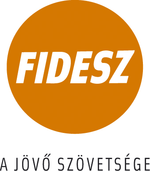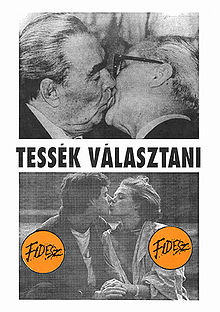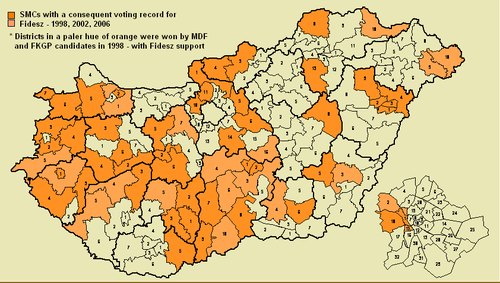- Fidesz
-
- "Hungarian Civic Party" redirects here. For the political party in Romania, see Hungarian Civic Party (Romania).
Fidesz - Hungarian Civic Union
Fidesz - Magyar Polgári Szövetség
President Viktor Orbán Founded 30 March 1988 Headquarters 1088 Budapest, VIII. Szentkirályi Street 18. Ideology Conservatism
National conservatism[1][2][3]Political position Right-wing[4][5][6] International affiliation Liberal International (1992 - 2000),
International Democrat Union,
Centrist Democrat InternationalEuropean affiliation European People's Party European Parliament Group European People's Party Official colours Orange National Assembly 227 / 386European Parliament 13 / 22Website http://www.fidesz.hu/ Politics of Hungary
Political parties
ElectionsThe Fidesz – Hungarian Civic Union (Hungarian pronunciation: [ˈfidɛs]; in full, Hungarian: Fidesz – Magyar Polgári Szövetség) is a major right-wing conservative party in Hungary. At the 2010 election in Hungary, Fidesz-KDNP[7] won a two-thirds majority of seats by gaining 52% of the votes, with Fidesz winning 227 seats and KDNP winning 36. Fidesz is a member of the European People's Party (EPP).
Contents
History
The party was founded in 1988, named simply Fidesz (Fiatal Demokraták Szövetsége, Alliance of Young Democrats), originally as a youthful libertarian, anti-communist party. Fidesz was founded by young democrats, mainly students, who were persecuted by the communist party and had to meet in small, clandestine groups. The movement became a major force in many areas of modern Hungarian history, engaging itself on every level in the development of a democratic system, its members being active as guardians of fundamental human rights. The membership had an upper age limit of 35 years (this requirement was abolished at the 1993 congress).
In 1989 Fidesz won the Rafto Prize. The Hungarian youth opposition movement was represented by one of its leaders, Dr Péter Molnár, who became a Member of Parliament in Hungary. In 1992 Fidesz joined the Liberal International.[8]
Fidesz received 8.95% (1990), 7.02% (1994) and 29.48% (1998).
After its disappointing result in the 1994 elections, Fidesz changed its political position from liberal to conservative.[8] In 1995, it added "Hungarian Civic Party" (Magyar Polgári Párt) to its shortened name. The conservative turn caused a severe split in the membership. Péter Molnár left the party, as well as Gábor Fodor and Klára Ungár, who joined the liberal Alliance of Free Democrats.
Fidesz gained power in 1998 under leader and Prime Minister Viktor Orbán, who governed Hungary in coalition with the smaller Hungarian Democratic Forum and the Independent Smallholders' Party. In 2000, Fidesz joined the European People's Party and had its membership in the Liberal International terminated.[8]
Fidesz narrowly lost the 2002 elections to the Hungarian Socialist Party, by 41.07% to the Socialists' 42.05%. Fidesz had 169 members of the Hungarian National Assembly, out of a total of 386. Following the defeat, the municipal elections in October saw huge Fidesz losses.
In the spring of 2003, Fidesz took its current name, "Fidesz – Hungarian Civic Union".[8]
It was the most successful party in the 2004 European Parliamentary Elections, gaining 47.4% of the vote and electing 12 MEPs including Lívia Járóka, the second Roma MEP.
Some considered[citation needed] the election of Dr. László Sólyom as the new President of Hungary as the most recent success of the party. He was endorsed by Védegylet, an NGO including people from the whole political spectrum. His activity does not entirely overlap with the conservative ideals and he championed for elements of both political wings with a selective, but conscious choice of values.[9]
In 2005 Fidesz and the Christian KDNP formed an alliance for the 2006 elections. Despite winning 42.0% of the list votes and 164 representatives out of 386 in Parliament, they were beaten by the socialist and liberal coalition of MSZP and SZDSZ.
On October 1, 2006, Fidesz won the municipal elections, which counterbalanced the Socialist Party (MSZP)-led government's power to some extent. Fidesz won 15 of 23 mayoralties in Hungary's largest cities—although its candidate narrowly lost the city of Budapest to a member of the Liberal Party—and majorities in 18 out of 20 regional assemblies.[10][11]
In the 2009 European Parliament election, Fidesz won a landslide victory, gaining 56.36% of the vote and 14 of Hungary's 22 seats. This predicted a landslide in the 2010 parliamentary elections, where they won the outright majority in the first round on April 11, with the Fidesz-KDNP alliance winning 206 seats, including 119 individual seats. In the final result, they won 263 seats, of which 173 are individual seats.[12] Fidesz holds 227 of these seats, giving it an outright majority in the National Assembly by itself.
Ideology
Around 1995, Fidesz switched from liberalism to conservatism.[1]
Currently Fidesz is considered a conservative party on social issues.
Youth
The Youth of Fidesz is the Fidesz Youth Section that was created as a section within the party gathering all party members below the age of 30. It was founded by the Fidesz congress and established in December 2005. The chairman of Fidesz Youth Section is Dániel Loppert. Fidesz Youth Section is member of European Democrat Students (EDS) and observer member in the Democrat Youth Community of Europe (DEMYC).
Electoral results
Results on the lists:
Year Result Voters Status 1990 8.95% 439.481 opposition 1994 7.02% 379.295 opposition 1998 28.18% 1.263.522 government 2002 41.07% 2.306.763 opposition 2006 42.03% 2.272.979 opposition 2010 52.73% 2.706.292 government In 2002 the Fidesz list ran together with the MDF. Before the 2006 elections MDF separated from the coalition, replaced by the KDNP in the alliance.
Single Member Constituencies Voting Consistently for Fidesz
The SMCs shown on the image have voted for Fidesz ever since 1998. SMCs with a paler hue of orange elected FKGP candidates in 1998, as part of a pact between the two parties.
In January 2010, László Kövér, head of the party's national board, told reporters the party was aiming at winning a two-thirds majority at the parliamentary elections in April. He noted that Fidesz had a realistic chance to win a landslide. Concerning the radical nationalist Jobbik party's gaining ground Kövér said it was a "lamentably negative" tendency, adding that it was rooted in the "disaster government" of the Socialist Party and its former liberal ally Free Democrats.[13]
References
- ^ a b Bakke, Elisabeth (2010), "Central and East European party systems since 1989", Central and Southeast European Politics Since 1989 (Cambridge University Press): p. 79, http://books.google.de/books?id=oFXdiS25N78C&pg=PA79&dq=fidesz+national+conservative&hl=de&ei=55XGTuj7FZDNswaJ6bDtBg&sa=X&oi=book_result&ct=result&resnum=9&ved=0CF0Q6AEwCA#v=onepage&q=fidesz%20national%20conservative&f=false, retrieved 17 November 2011
- ^ Verseck, Keno (28 April 2011). "Roma Defenseless against Extremist Vigilantes". Der Spiegel. http://www.spiegel.de/international/europe/0,1518,759586,00.html. Retrieved 19 June 2011.
- ^ Hockenos, Paul (16 April 2010). "Central Europe's rightward slide". Global Post. http://www.globalpost.com/dispatch/europe/100415/central-europes-rightward-slide. Retrieved 19 June 2011.
- ^ "Fidesz: The story so far", The Economist, 18 December 2010, http://www.economist.com/blogs/dailychart/2010/12/fidesz, retrieved 18 November 2011
- ^ Right-wing Fidesz win election by landslide, Radio France Internationale, 12 April 2010, http://www.english.rfi.fr/europe/20100412-right-wing-fidesz-win-election-landslide, retrieved 18 November 2011
- ^ Seres, Balint (12 April 2010), "Right-wing Fidesz party wins by landslide in Hungary elections", news.com.au, http://www.news.com.au/breaking-news/right-wing-fidesz-party-wins-by-landslide-in-hungary-elections/story-e6frfku0-1225852566022, retrieved 18 November 2011
- ^ Fidesz had common regional and nationwide lists and had common candidates with KDNP in the 2010 election
- ^ a b c d Fidesz
- ^ (Hungarian) Sólyom politikaformáló erő akar lenni, Kern Tamás, Index, August 22, 2005
- ^ "VoksCentrum - a választások univerzuma". Vokscentrum.hu. http://www.vokscentrum.hu/onkorm/elemzo.php?jny=hun&mszkod=860001&mitmut=polgmjv. Retrieved 2010-04-17.
- ^ "http://www.taipeitimes.com/News/world/archives/2006/10/03/2003330242". Taipeitimes.com. 2006-10-03. http://www.taipeitimes.com/News/world/archives/2006/10/03/2003330242. Retrieved 2010-04-17.
- ^ "Országos Választási Iroda - 2010 Országgyűlési Választások" (in (Hungarian)). Valasztas.hu. 2010-05-03. http://www.valasztas.hu/hu/parval2010/354/354_0_index.html. Retrieved 2010-05-05.
- ^ By MTI. "Opposition Fidesz aims at two-thirds majority". Politics.hu. http://www.politics.hu/20100129/opposition-fidesz-aims-at-twothirds-majority. Retrieved 2010-04-17.
External links
- Fidesz – Hungarian Civic Union Official website
- Fidesz page on the website of the European People's Party
- Speech delivered by Mr Viktor Orban at the 17th Congress of Fidesz upon his election as president of Fidesz - Hungarian Civic Union, 17 May 2003 (from Google's cache)
- The History of FIDESZ (from Google's cache)
- Hungary's PM calls confidence vote
 Political parties in Hungary
Political parties in HungaryRepresented in the
National Assembly (386)Fidesz – Hungarian Civic Union (227) · Hungarian Socialist Party (48) · Jobbik – Movement for a Better Hungary (46) · Christian Democratic People's Party (36) · LMP – Politics Can Be Different (15) · Independent (14)Not represented in the Parliament* Hungarian Democratic Forum (2.67 %) · Civil Movement (0.89 %) · Hungarian Communist Workers' Party (0.11 %) · Hungarian Social Democratic Party (0.08 %)
* Limit for parties to join the National Assembly in Hungary is 5 % of popular votesRepresented in the
European Parliament (22)Fidesz – Hungarian Civic Union and Christian Democratic People's Party (14) · Hungarian Socialist Party (4) · Jobbik – Movement for a Better Hungary (3) · Hungarian Democratic Forum (1)Categories:- Political parties established in 1988
- Political parties in Hungary
- International Democrat Union member parties
- Conservative parties in Hungary
Wikimedia Foundation. 2010.



